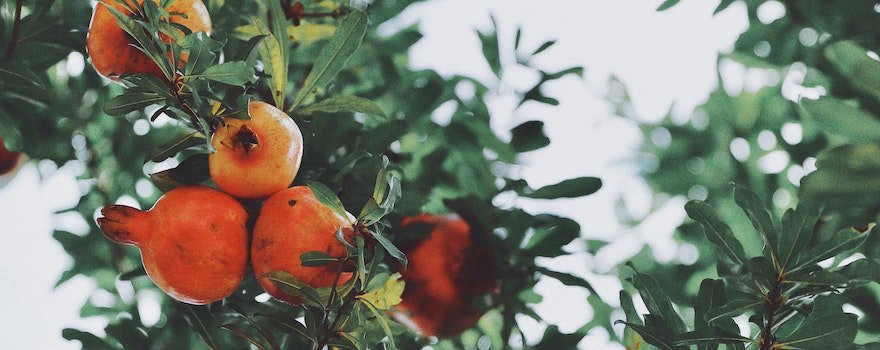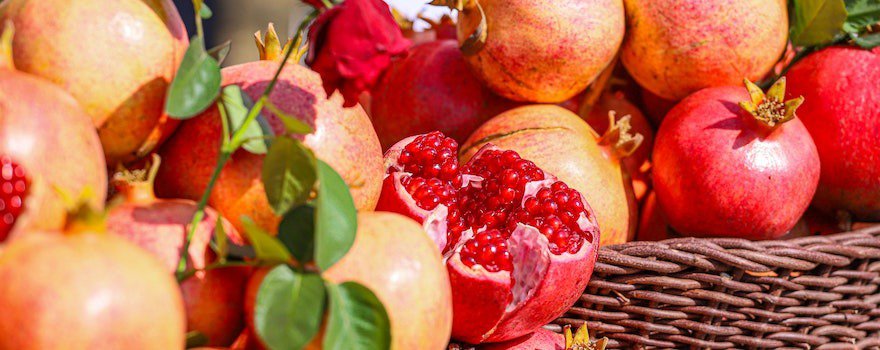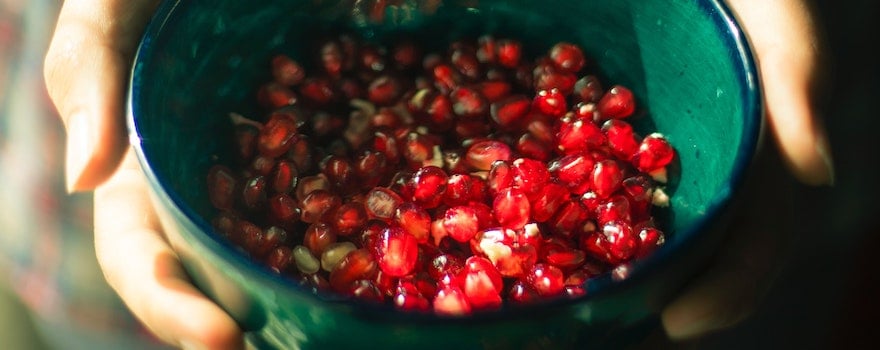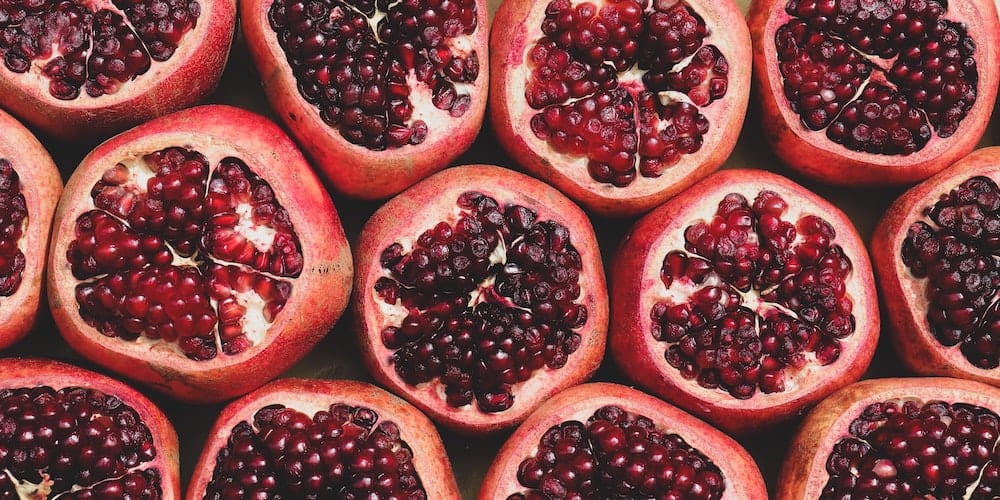POMEGRANATE BENEFITS
✓ Boosts immunity
✓ Source of antioxidants
✓ Anti-inflammatory
✓ Fights bacteria
✓ Potentially anti-cancer
What is a pomegranate?
The pomegranate is the fruit of the pomegranate tree (Punica granatum), a shrub typical of the Mediterranean regions. It is also found in China and South America (Chile, Argentina…). This fruit has the shape of an apple, with a diameter ranging from 10 to 15 cm. Initially green, it develops a beautiful reddish-orange color when ripe.
Each pomegranate can contain up to 400 seeds (or arils), enclosed in thick “compartments”. It is from this that it derives its Latin name “granatus“, which means “many-seeded”.
Les humains consomment ce fruit depuis des siècles. Les premières traces de son introduction remontent en Égypte, vers 1600 avant J-C. Elle a ensuite traversé les siècles, considérée comme un symbole de vie, de rajeunissement et comme un fruit sacré par de nombreuses populations : grecs, romains, assyriens…
Also read | Dany’s pomegranates: between tradition and innovation in the province of Alicante
Today, the pomegranate attracts researchers because of its many medicinal properties. In addition to boosting the immune system, it has antioxidant, anti-inflammatory, and antibacterial effects. It also shows promising anticancer effects. In cosmetics, it is regularly found in anti-aging products.
Nutritional composition
- Acides aminés
- Vitamines : B3, B5, B6, B9, C, E, K
- Minéraux et oligo-éléments : potassium, phosphore, magnésium, zinc, fer, calcium, sodium
- Protéines
- Glucides
- Fibres
- Actifs antioxydants : punicalagines, flavonoïdes, anthocyanes
- Acides gras : acide punicique, oméga-6

Benefits of pomegranate
🛡 Boosts immunity
With 20 mg per 100 g, the pomegranate is an excellent natural source of vitamin C or ascorbic acid. Thus, it ranks ahead of many fruits such as persimmon, pineapple, blueberry, and clementine.
Consuming this Mediterranean fruit helps energize and boost the immune system. The body is strengthened and better able to fight infections, particularly in winter. It also contains other immunity-supporting vitamins such as vitamin E, which helps protect the immune system.
This review from the University of Belgrade (Serbia) provides information on the composition of the pomegranate, notably its vitamin C content.
🥝 Source of antioxidants
Because it contains large amounts of vitamins C and E, the pomegranate is also an antioxidant: it helps fight free radicals that damage cells and accelerate aging.
But it also contains valuable antioxidant compounds, including punicalagins. These tannins, present in the pomegranate’s skin and juice, are particularly effective at neutralizing free radicals and inhibiting oxidative stress.
This study from the School of Medicine at the University of Washington (United States), conducted in pregnant women, shows how pomegranate punicalagins reduce oxidative stress.
🔥 Anti-inflammatory
Pomegranate has anti-inflammatory properties that help relieve many conditions, including chronic ones : heart disorders, osteoarthritis, rheumatoid arthritis, diabetes, neurodegenerative diseases…
Again, it is the punicalagins that are responsible for this action. They suppress the activation of NF-κB, a protein involved in the inflammatory response, and inhibit the activity of pro-inflammatory cytokines (interleukins 6 and 8).
This study from Shahid Beheshti University (Iran), conducted in diabetic patients, shows the anti-inflammatory activity of pomegranate juice.
🦠 Fights bacteria
Pomegranate has antibacterial activity. It is thus capable of fighting many pathogenic bacteria such as Staphylococcus aureus, Escherichia coli, and Listeria monocytogenes. This action is thought to be due to the phenolic compounds and flavonoids it contains.
It also exerts anti-biofilm activity by preventing bacterial adhesion to mucous membranes and tissues.
This study from the Federal University of Minas Gerais (Brazil), conducted directly in the laboratory, shows how pomegranate fights the bacterium Staphylococcus aureus.
🔬 Potentially anti-cancer
In several studies, pomegranate has shown promising anticancer effects. Its potential has been studied in breast, colon, lung, skin and prostate cancers.
This is thought to be due to its powerful antioxidant activity and its richness in anthocyanins, ellagitannins and tannins. It slows the growth of cancer cells and induces apoptosis (programmed cell death).
This review from the University of Alabama at Birmingham (United States) presents the anticancer potential of pomegranate.

How to eat a pomegranate?
Fresh pomegranate
Pomegranate harvest extends from September to December. This is when you are most likely to find fresh pomegranates in stores.
Only the seeds are edible. To remove the seeds from your fruit, cut it into quarters, remove the skin and then the seeds, taking care to remove the membrane that surrounds them. You can also proceed as shown in the video below, a less messy option but one that requires more dexterity!
The seeds are eaten as they are or added to salads, fruit mixes, rice, vegetable dishes…
Fresh fruit can be stored for several weeks in the refrigerator. But the seeds degrade fairly quickly, so it’s better to freeze them if you are not going to consume them right away.
Pomegranate juice
Pomegranate juice is often sold in stores. It’s a refreshing drink, both sweet and tangy. Make sure it is pure juice, even if you then dilute it with water or another juice.
If you have a press or a juice extractor, you can easily make your homemade pomegranate juice. To do this, remove the seeds and blend them with a little sugar, honey, or lucuma powder lucuma.
Dried pomegranate seeds
You can find dried pomegranate seeds in specialty shops and health food stores. They are enjoyed plain or mixed into your cereals, salads, yogurts, or pastries. They pair wonderfully with goji berries or açaí, blackberries, cranberries…
Sustainable consumption: favor organic, local, and fair-trade pomegranates
✓ Today, the pomegranate is mainly cultivated in North Africa : Tunisia, Turkey, Morocco, Egypt… But, faced with growing demand, some producers have revived pomegranate cultivation in France, as in the Gard region which benefits from a favorable climate.
✓ If you can, choose pomegranates from France that are grown organically. Also opt for fruits harvested under fair trade to support the work of small producers.
✓ You can also find excellent varieties in Spain.

Dosage
There is no truly recommended dosage for pomegranate seeds, which can be consumed throughout the day (but not in excess). As juice, it is recommended to drink between 250 and 300 ml per day.
Contraindications and side effects
Pomegranate consumption has some contraindications :
- Parce que la grenade est riche en fibres, les personnes aux intestins fragiles ou irrités doivent en consommer avec modération ;
- Le jus de grenade est très riche en fructose et doit donc être bu avec parcimonie chez les personnes diabétiques ;
- En raison de son action sur la tension, les personnes souffrant d’hypotension artérielle doivent éviter d’en consommer ;
- La grenade peut avoir des interactions avec certains médicaments (anticonvulsivants, anti-inflammatoires, antidépresseurs, antalgiques…).
Excessive pomegranate consumption has some side effects :
- Troubles digestifs
- Nausées
- Vomissements
- Douleurs abdominales
- Diarrhée
- Réaction allergique
If you experience side effects, stop taking it and consult a doctor.
History, culture and market of the pomegranate

Demand for pomegranates is rising sharply worldwide. Some producing regions are recognized for the quality of their fruit, such as Ouled Abdellah in Morocco.
It also benefits from a Protected Geographical Indication (PGI) for its Sefri variety and hosts the annual pomegranate festival which demonstrates the importance of the pomegranate tree for this region and local producers.
Report by Julia Perez
Sources and scientific studies
Yardena Arnoni, Elliot M. Berry, 2015. On the Origins and Evolution of the Mediterranean Diet.
Vesna Vučić, Milkica Grabež, Armen Trchounian, Aleksandra Arsić, 2019. Composition and Potential Health Benefits of Pomegranate: A Review.
Baosheng Chen, Methodius G Tuuli, Mark S Longtine, Joong Sik Shin, Russell Lawrence, Terrie Inder, D Michael Nelson, 2012. Pomegranate juice and punicalagin attenuate oxidative stress and apoptosis in human placenta and in human placental trophoblasts.
Golbon Sohrab, Javad Nasrollahzadeh, Hamid Zand, Zohreh Amiri, Maryam Tohidi, and Masoud Kimiagar, 2014. Effects of pomegranate juice consumption on inflammatory markers in patients with type 2 diabetes: A randomized, placebo-controlled trial.
Pooja Sharma, Sarah F McClees, Farrukh Afaq, 2017. Pomegranate for Prevention and Treatment of Cancer: An Update.



